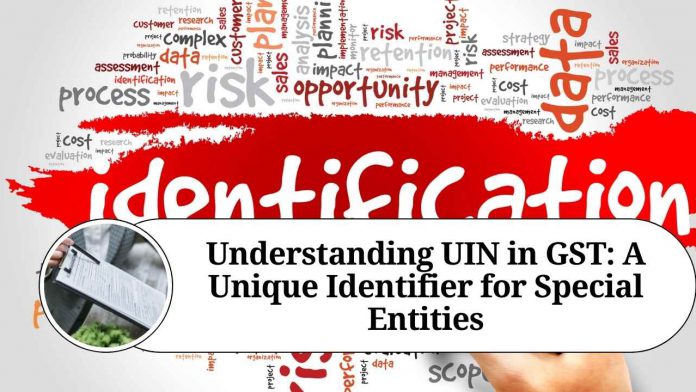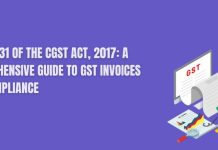Introduction
The Goods and Services Tax (GST) has revolutionized the way taxation is implemented in India. It has streamlined the indirect tax system by bringing various taxes under one umbrella. To ensure smooth functioning and accurate identification of entities under the GST regime, the Unique Identification Number (UIN) plays a vital role. In this blog, we will delve into the concept of UIN in GST, its purpose, and how it affects specific entities.
What is UIN in GST?
The Unique Identification Number (UIN) is a special identifier issued under the GST regime for specific entities that are not liable to pay tax in India but are involved in taxable supplies. It is a 15-digit alphanumeric code that is unique to each entity and helps distinguish them from regular taxpayers.
Purpose of UIN:
The primary purpose of assigning UINs is to facilitate the identification of entities that have a tax-exempt status but are still engaged in taxable activities. These entities typically include:
a) Foreign diplomatic missions and embassies.
b) United Nations organizations and other international agencies.
c) Consulates or other trade representation offices of foreign countries.
d) Special economic zones (SEZs) and their developers or units.
UIN Application Process:
Entities eligible for a UIN need to apply for it through the GST portal. The application process generally involves the following steps:
a) Registration: The entity must register as a taxpayer on the GST portal by providing the necessary details. b) Application Submission: Once registered, the entity can apply for a UIN by filling out the appropriate form and submitting it online. c) Document Verification: The GST authorities verify the application and the supporting documents provided by the entity. d) UIN Allotment: Upon successful verification, the entity is issued a UIN for use in their transactions.
UIN Usage:
Entities possessing a UIN must ensure its correct usage to comply with GST regulations. Here are a few key points regarding UIN usage:
a) Invoices: UIN holders should mention their UIN on all invoices or any other documents related to taxable supplies. b) Tax Liability: While UIN holders are exempt from paying GST, they are still required to file periodic returns to disclose their transactions. c) Refunds: If a UIN holder incurs GST on their purchases, they can claim a refund by following the prescribed procedures. d) Compliance: UIN entities should adhere to the rules and regulations of the GST framework to avoid penalties or legal implications.
Impact on Regular Taxpayers:
For regular taxpayers, dealing with entities having a UIN may require some additional steps:
a) Verification: When transacting with an entity with a UIN, regular taxpayers should verify the UIN’s authenticity and validity through the GST portal. b) Input Tax Credit: Regular taxpayers cannot claim input tax credit on purchases made from UIN entities since they are exempt from tax.
Conclusion
The Unique Identification Number (UIN) in GST serves as an essential tool for identifying entities that have a tax-exempt status but are still involved in taxable supplies. It enables seamless tracking of transactions and promotes transparency within the GST framework. Understanding the concept and proper usage of UINs is crucial for both UIN holders and regular taxpayers to ensure compliance with GST regulations. By streamlining the identification process, UINs contribute to the overall efficiency and effectiveness of the GST system.
Read more useful content:
Frequently Asked Questions (FAQs)
Q1: What is UIN in GST?
A1: UIN stands for Unique Identification Number. It is a 15-digit alphanumeric code issued under the Goods and Services Tax (GST) regime to identify entities that are exempt from paying tax but engage in taxable supplies.
Q2: Which entities are eligible for a UIN?
A2: The following entities are typically eligible for a UIN:
Foreign diplomatic missions and embassies.
United Nations organizations and other international agencies.
Consulates or other trade representation offices of foreign countries.
Special economic zones (SEZs) and their developers or units.
Q3: How can an entity apply for a UIN?
A3: To apply for a UIN, eligible entities need to follow these steps:
Register as a taxpayer on the GST portal.
Fill out the UIN application form and submit it online.
Provide the necessary supporting documents.
Wait for the application to be verified by the GST authorities.
Upon successful verification, the entity is issued a UIN.
Q4: What is the purpose of having a UIN?
A4: The primary purpose of a UIN is to identify entities that are exempt from paying GST but are involved in taxable supplies. It helps maintain transparency, track transactions, and distinguish these entities from regular taxpayers.
Q5: How should a UIN be used by the entity?
A5: Entities with a UIN should:
Mention their UIN on all invoices and other relevant documents related to taxable supplies.
File periodic returns to disclose their transactions, even though they are exempt from paying GST.
Adhere to the rules and regulations of the GST framework to ensure compliance.
Q6: Can regular taxpayers claim input tax credit on purchases from UIN holders?
A6: No, regular taxpayers cannot claim input tax credit on purchases made from UIN entities since UIN holders are exempt from tax.
Q7: How can regular taxpayers verify the authenticity of a UIN?
A7: Regular taxpayers can verify the authenticity and validity of a UIN through the GST portal by using the search or verification feature provided.
Q8: Can UIN holders claim refunds for GST paid on their purchases?
A8: Yes, if UIN holders incur GST on their purchases, they can claim a refund by following the prescribed procedures for refund applications.
Q9: Are there any penalties for non-compliance with UIN regulations?
A9: Yes, entities with a UIN must comply with the rules and regulations of the GST framework. Failure to comply may result in penalties, fines, or other legal implications as per the GST laws.




















